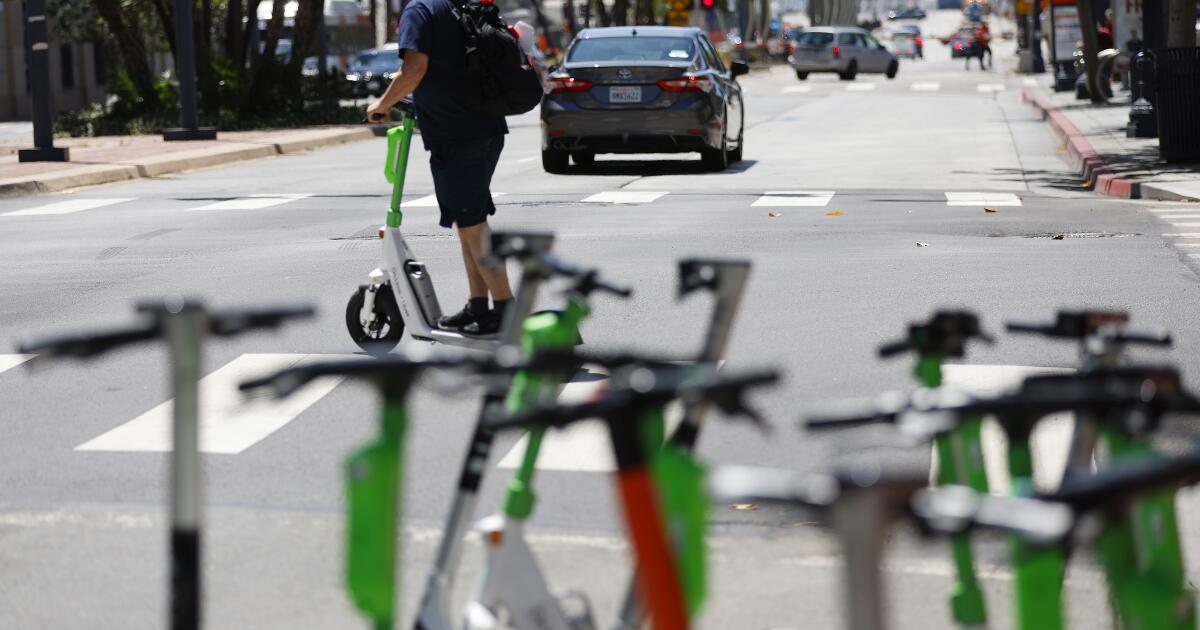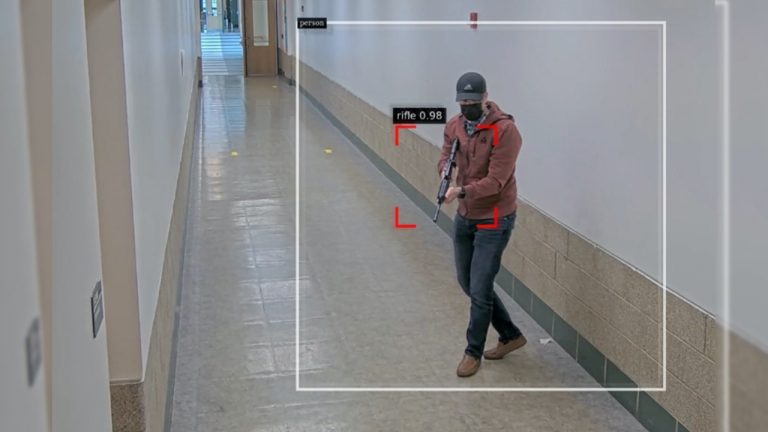
Two months after the last remaining electric scooter company pulled out of San Diego, the city’s controversial plan to roll back its strict scooter regulations will be presented to the City Council for approval Monday.
City officials said this week they are hopeful the looser rules will persuade scooter companies to return. And one of the biggest, Lime, is praising the softer regulations and saying it hopes to return as soon as possible.
But leaders of the city’s coastal communities and an advocacy group for safe sidewalks are stepping up criticism of the rollback, saying it will compromise safety and essentially subsidize scooters with taxpayer money.
City officials say scooter companies must be lured back because scooters are key to San Diego’s climate action plan. They say scooters reduce greenhouse gases by providing a convenient alternative to cars.
But the coastal leaders and other critics say the scooters are used mostly by tourists along the coast and downtown, not by ordinary residents trying to streamline their commute to work or school.
And after a rush in popularity several years ago, scooter companies have more recently been struggling financially in cities around the world.
A key element of the proposed rollback is San Diego’s retreat from a rule that aims to keep sidewalks safe by forcing companies to install speed-throttling technology that automatically slows scooters on sidewalks to 3 mph.
The city’s proposal would allow scooters to travel 15 mph on sidewalks, but riders would get a loud audio alert and see a flash when they ride on a sidewalk.
The idea is that the alert will be so irritating that the scooter rider will quickly leave the sidewalk. But critics say pedestrians will be still be in more danger, and the alert will only add one more unpleasant noise to San Diego’s already loud tourist areas.
Other proposed changes include allowing scooters to be deployed in more locations, lowering city fees scooter companies must pay and softening identification requirements for riders that aim to prevent underage use.
City officials have stressed that the proposed rollback does not eliminate the current bans on sidewalk parking and rules against using scooters on the city’s boardwalks.
But that hasn’t softened the pushback.
“The buzzer is just going to be annoying — it’s not going to stop anyone,” said Larry Webb, chair of the Mission Beach Town Council and leader of the Coastal Coalition. “We have major safety concerns.”
Janet Rogers, leader of a group called Safe Walkways, said the city won’t be able to cover the more than $1 million it spends annually regulating and monitoring scooters if the proposed fee rollback is approved.
The proposal would modify the city’s fee structure from charging scooter companies for every device deployed each day to charging them only when a scooter gets used. But each company would still have to pay an annual $20,000 fee to operate in the city.
Rogers also contends the problems facing scooters go far beyond city rules.
Many scooter fans have bought personal scooters in lieu of renting them, while neighborhood shuttles and ride-hail services like Uber depress demand.
Scooter companies have also suffered from rampant theft of their devices, a problem that’s been particularly bad in San Diego because of its proximity to the U.S.-Mexico border.
Lime said this week that theft concerns would still be a sticking point that must be addressed before it returns, even if the city follows through on rolling back its regulations.
“Lime absolutely wants to be back on the ground in San Diego and hopefully as soon as possible,” said Alyssa Edelen, a Lime regional general manager. “The city has made real progress on updating regulations to set up a safe, tidy and successful program. We hope to work with them on a few more changes like addressing binational theft to ensure our return would be a win-win for the city and its residents.”

To win back scooter companies that pulled out of the city, San Diego officials are proposing to undo some rules limiting how scooters can be ridden on sidewalks. But they stress that their plan wouldn’t undo the rules against using them on boardwalks, such as this one on Mission Beach seen in 2019.
(K.C. Alfred/The San Diego Union-Tribune)
Alyssa Muto, who oversees scooter regulations as head of the city’s Sustainability and Mobility Department, said she is optimistic the companies will come back. But she said it might take some time.
“We are hopeful that these proposed amendments provide for the flexibility needed over the next year or so to redeploy and get back to an adequate level of shared mobility devices to respond to the demand of our residents,” Muto said by email.
But she noted that the scooter industry is going through what she called “a period of adjustment.”
Bird, the world’s leading operator, declared bankruptcy in December a few weeks after ceasing operations in San Diego. And other operators have reported financial struggles.
Bird did not respond to requests for comment this week.
Between August 2021 and last fall, San Diego went from having half a dozen operators and an average of 8,000 scooters deployed to having zero operators and zero scooters deployed — except on college campuses.
UC San Diego and San Diego State University have separate contracts with scooter companies that are limited to just those campuses.
The lack of scooters leaves San Diego without a convenient option for getting around that city officials say is crucial to fighting climate change and reducing congestion as neighborhoods become more densely populated.
When the proposed rollback was approved by the council’s Active Transportation and Infrastructure Committee in November, Councilmember Joe LaCava said it would be wrong to view the city’s retreat as caving to the industry.
“I think it’s also important to recognize that this is not about us enabling a private for-profit business,” he said. “This is the city trying to meet its mobility goals and its climate action plan goals and looking for third parties to provide the equipment.”
But Webb, the coastal leader, said there is no evidence that scooters are solving the so-called last-mile commuting problem — allowing a person to use transit by making it easier to access the trolley or buses.
“Scooter use is a recreational thing, and the companies are targeting tourists,” he said. “That’s why you only see them in Districts 1, 2 and 3.”
Webb said that if the new rules were really about combating climate change, they would require scooter companies to deploy devices in all nine council districts and at every trolley stop and major bus stop in the city.
Webb also said the city has exaggerated how badly the scooters are missed.
“It’s wonderfully peaceful since they went away, and I haven’t heard anyone complain that they miss the scooters,” he said.
Monday’s council meeting is scheduled to begin at 2 p.m. at City Hall, 202 C St.





